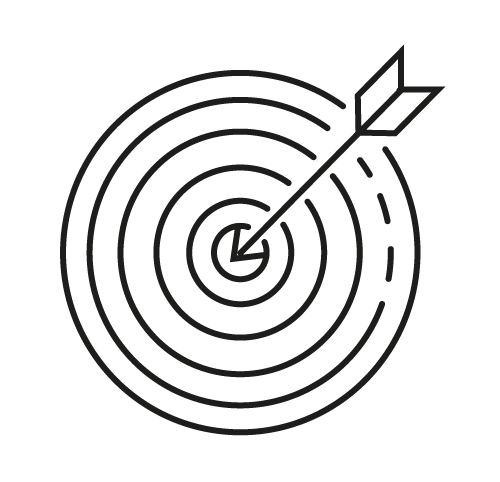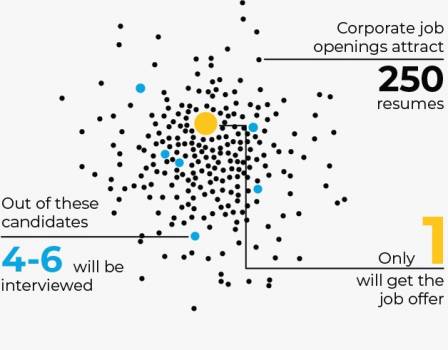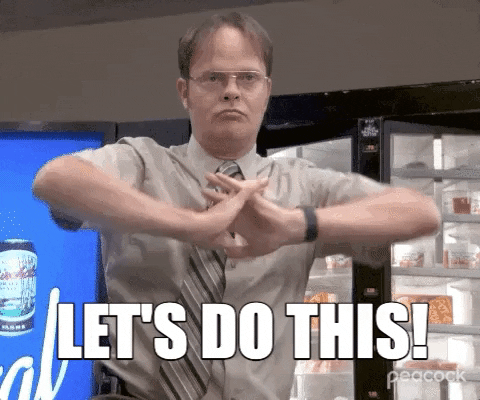A 5-Step Guide
To Getting a Job
How to Find Work in Bali
Are you looking for a new job in Bali, Indonesia? Or curious about the next steps of your career in Bali, Indonesia?
Or have you already managed to secure an interview? Maybe are you one step ahead and thinking about how to prepare for the job-hunting process?
You're in the right place.
In this simple guide, we’ll teach you all you need to know when searching for a new job by:
- Resume / CV tips
- Cover letters
- How to use social media to your advantage
- Interview tips and techniques
- How to follow up after an interview.
Let’s go.

TABLE OF CONTENTS
1. Starting Your Job Hunt

It can be a daunting start when you are looking for a new job. You may feel slightly overwhelmed and not know where to start.
Before you jump onto your laptop and trawl through the job search boards…
You need to understand what you’re looking for first.
Are you hoping for more responsibilities? Are you dying to work for a company that allows a dog in the office?
Take time to identify your goals (big and small), this will help clarify your expectations for your next job role.
Starting Your Job Search Online
The time has come, and you have decided you're going to take the next step in your career.
At this time, it’s important to have an active online presence to use for networking and showcasing your skills and experience.
You can use social media platforms such as LinkedIn, to help you connect with contacts who may be able to assist you in your job search and recommend you to companies that are well suited to you.
You may already have your next step in mind…
Take this into consideration and think about how you can create an opportunity on the relevant social media platform.

Here’s an example;
If you are in the Hospitality industry, show on your social media platforms that you have a strong interest in food, beverages, and hospitality. Post about a recent dining experience, your favorite meal or place to go to hang out in Bali.
If you are looking to get a job in marketing or further your career in marketing, be active on LinkedIn or Twitter, share the latest news in Marketing – like video marketing trends 2022.
Make sure you take the time to update all your work-related social pages and the settings aren't private so that prospective employees can find you.
Think about it, if it's between you and another candidate, and the employer is struggling to choose between you both. The other candidate has a strong work social media presence that aligns with their company culture and passions, they may be likely to be swayed to that candidate.
However, if you have any social media pages that are for personal use only, DO set these to private!
Sharing photos or being tagged from a party or night out on Instagram or Facebook, is common for us all – sometimes good, sometimes bad 😉
It could be one photo or post where you’ve expressed your personal opinion that could sway a potential employer's mind.
Better to be safe than sorry.
Google Search
When starting your job search it is always worth using Google to see what shows up when you search your name – that way you will know if there are any photos or posts that could lower your chances of an interview.
Think of it like going on a date – you would always check out that person before meeting them right?
The same applies to employers, it's not the nicest of thoughts. But, let's be real, we all do it.
It's quite easy for employers to find the information you may prefer to keep private – if anything like this does show, make sure to change your profile settings or delete what you think should be deleted.

Be Professional

Make sure all your profile pics are suitable for prospective employers to see. Even if you have your Facebook settings private, your profile image can still be seen.
On LinkedIn, always use a professional-looking shot, or as near to one as you can, as this is a professional networking platform.
Keep in mind that you are probably connected or are friends with colleagues on social media sites, so anything you may post about a new job search may be read by your current employer or co-workers.
If you share your companies business – good or bad – or post inappropriate content, not only could this get you into trouble with your current manager, but possible hiring managers will also see it too.
And remember, Tweets show up in Google search so watch what you tweet as you don't know who might read it.
Social Networking
Once you’ve identified where you want your next career move to be…
Whether a specialism, sector or particular brand – it is time to start building your network. Make connections with key stakeholders, follow career experts, and contribute to relevant discussion groups.
And remember: Like most things, it works both ways.
The more you are willing to help someone else, the more likely they will be to help you. Regularly reach out to your connections, write recommendations and reviews, and share interesting content with them.
By doing this, when you need an introduction or a referral, you should have many willing 1st or 2nd hand connections to support you in return.
Giving you a helping hand in the recruitment process
Whether you are new to the job-hunting market or have gone through the job searching processes a few times, it is incredibly beneficial to have an experienced professional on your side to guide you through the challenges and pitfalls.
Headhunting agencies will proactively go out and use their network to open up job opportunities for you.
Bonus Tip
Your LinkedIn profile must back up any experience, qualifications, or skills that you’ve listed on your CV – and vice versa. Whilst it is recommended to tailor your CV for each job application to focus on the relevant and required skills, you must make sure the job titles, companies, and dates quoted match across all platforms and your CV.
2. CV / Resume Tips

Your resume/CV and portfolio are the most essential parts of the whole job-hunting process. This is what creates an opportunity to meet with a potential employer.
Think of this as your foot in the door to a company.
It is important to present them to potential employers in a way that shows you are more than capable of the position you are interviewing for!
While there is no magic trick for creating a great resume, there are ground rules for improving it and increasing your chances of getting contacted by a recruiter!
Here are our tips on building the perfect resume:
While there are many suggestions out there on how to improve your resume and CV, it is almost universally agreed that you need to tailor your portfolio for each specific role and business.
For example, you want your resume to communicate that you understand what your employer is looking for and that you can be the solution!
Customization of your resume accomplishes two key things:
- It conveys your understanding of the role and what they are looking for
- It emphasizes your strengths and how they relate to the job!
A surprising thing that many people don’t realize about job recruiting is that it’s not actually about the potential candidate; the process is more about the hiring company and what the recruiting manager needs.
So, keep this in mind.
How do you customize your resume / CV to the best of your advantage?
- Do your research. The more you know about the company and how they run their business, the more information you can use to tailor your resume
- Apply your knowledge. To the fun part! Now that you know their background and what they are looking for, show in your resume that you are the answer to their problem!
CV Writing / Resume Writing
Writing a resume has never been easy; especially in this day and age of mobile, online, and technological landscape.
It’s essential to optimize your subject to increase the chance of the recruiter seeing your application. Make it simple and clear in your email!
Here is an example of the format you can use for the subject of application:
Name – Position Applying For – Application
Example: Harry – Marketing Manager – Application
Easy, peasy, lemon squeezy!
Free CV Template
CV & Resume Tips
Let’s be honest: we all skim more than we read. So, to counter this habit of ours, make sure to KISS:
Keep It Short and Sweet <3
What does this mean? We promise you, it’s nothing scandalous.
Your application shouldn’t look like this ➟

Let us teach you how to KISS…
- In your cover letter, write short paragraphs, three to four lines maximum
- Highlight your best achievements. Leave the mediocre stuff out
- Bullet point your duties, with the most relevant duties at the top
- Every word counts. Keep it “lean and mean” – be straightforward yet persuasive.
You want to make sure that your resume is showing the best of yourself as a candidate.
Finally, always proofread.
You wouldn’t believe how many CV applications we have received that look great, and then the email is full of spelling or grammar mistakes.
3. How To Use Social Media To Your Advantage

In the beginning, it was all fun and games.
But social media isn’t just used to connect with friends and family anymore.
In recent years, it has become a valuable job search tool that many potential candidates underestimate.
In a survey of recruiters and hiring managers conducted by LiveCareer, Facebook emerged as the clear winner for managing your professional social media presence (74%)…
Followed by LinkedIn (56%) and Instagram (49%).
They also found that as many as 68% of recruiters said job seekers need a LinkedIn profile in 2021, and 65% of hiring managers said that they don't mind being contacted by potential candidates on LinkedIn.
Studies have also shown that 92% of companies are using social media for hiring and that three out of four hiring managers will search for a candidate’s social profiles 👀
Whether you’re a recent graduate or a seasoned professional looking for a new opportunity, social media is a useful job search tool.
Here are strategies from our experts on how to strengthen your social media profiles for job hunting prospects!
Know-How to Choose the Right Platform
We all know this saying: The more the merrier.
Guess what? This doesn’t apply to social media in the job hunting context!
Don’t try to maintain too many accounts – that will make it difficult for you to keep them up to date.
The general rule is to focus on one or two for your job search, with LinkedIn being the primary one:
- Confirm that your contact information is accurate and that your LinkedIn profile matches the details on your resume
- If you have social channels that you've been ignoring for a while, like a Twitter or Facebook account you haven’t used in three years, remove them
- Let recruiters know you’re open to new job opportunities by changing your setting on LinkedIn. Specify the types of positions that you’re interested in and your preferred location – your profile will appear in search results when recruiters look for suitable job candidates!
Use Social Media for Research
Surprise! Employers often post relevant articles and other information related to their interests, passions, and changes happening within the company!
Utilize this to your advantage.
Use this information to learn more about the organizations you're interested in.
This intelligence can strengthen your job search and interviews by helping you understand the culture and how they treat employees:
- Use LinkedIn to identify leaders in the companies that you are targeting
- By following them, you can get their attention!
- Knowing their interests, passions and organizational changes will put you at the forefront of the hiring manager's mind.
How to Present Yourself on Social Media
You should have a consistent brand across your social platforms.
You want people to know who you are, what you do, and where you’re going.
Make sure any public information on your various profiles is super clean.
- We all have been tagged or posted pictures that maybe you don’t want your parents to see, this rule applies to potential employers too!
- You should also consider removing any posts that are politically divisive or could be considered offensive.
You should have a clear, friendly, recent, and appropriately professional image on LinkedIn.
And if you're not sure what “appropriately professional” means? Take a look around at what the people in your industry are wearing to see how competent, influential, and friendly your photo makes you look.
For example, if you are a fashion photographer, a colorful, more artsy photo would work well.
If you are looking for an accountant position, then something more office-friendly would work well.
Social Media Strategy
A social media account should never live in isolation—it should link off to somewhere that people can learn more about you!
On all your professional social media accounts, make sure to:
- Include a link to the projects you’ve worked on from current jobs or past jobs
- No matter how big or small the projects, you never know what previous works that you have done or been a part of that might capture a potential employer's eye.
You have tidied up your social media accounts. You have compiled your best achievements and put all the links to your work.
Now it’s time to add the finishing touch.
Your professional social media profiles and portfolios are now a great representation of who you are and where you’re going, so make sure they’re out there!
- Put your professional social media accounts and portfolio on your job search materials!
- Mention your industry-specific network on your CV
- Show your potential employer where to find you on your business card or your email signature
- If you’ve done the work to make them good and professional, don’t be shy about sharing them!
You will boost the exposure of your professional profile and be noticed by the wider world by using social networking sites in your job hunt.
It puts your skills and experience readily accessible and allows you to network online with experts from a multitude of sectors.
By following these strategies, you’ll be able to use social media to land a job you love!
4. Interview Tips And Techniques
Congrats!
You’ve smashed the CV/resume application process, and now you have your job interview scheduled.
Now it’s time to prepare, and we’ve got you covered.
Let this sink in:
A job interview is the ultimate opportunity to sell yourself to a potential employer.
The interviewers are analyzing you, assessing your skills, evaluating your qualifications, and trying to see whether you are the best fit for their organization.
(No pressure)
It's critical to be able to prove to the hiring manager that you're the ideal candidate for the position, and possess the abilities and credentials required for successful employment!
Here are some pointers to help you ace your interview and stand out as a good contender for the job!
Before The Interview
Do Your Research
In the days leading up to the interview, spend some time researching the company thoroughly.
Understanding key information about the company you’re interviewing with can help you go into your meeting with confidence!
- Start by researching the company and your interviewers
- Using the company’s website, social media posts, and recent press releases will provide a solid understanding of the company’s goals and how your background can be suited to these goals
- Hiring managers know that they’re dealing with someone serious about the position when the candidate has taken the time to learn about the company.
- First impressions count!
Practice Interview Techniques and Responses
While no one wants to hire someone who acts “mechanically” and comes across as too rehearsed, feeling prepared will help you to feel confident enough to be yourself.
In turn…
This can enable you to better recall relevant details from your past employment during the interview!
Practice answering some of the standard interview questions!
- Prepare your answer to the common question: “Tell me about yourself, and why are you interested in this role with our company?”
- The idea is to quickly communicate who you are and what value you will bring to the company and the role
- It’s your chance to shine!
- If you feel overly nervous about the interview, have a family member or friend role play as the interviewer and video record yourself
Employers sometimes try to challenge interviewees with tough questions to judge their compatibility and to see how they cope under pressure. Be not afraid!
- Expect questions about work experiences, decision making, your experience, and everyday duties
- These questions identify applicants' key competencies and skills, so it’s vital to prepare answers to match your skills to the employer’s requirements
- Prepare a list of answers to share with the interviewer.
At High & Low, we take the time to meet you on the day of your interview – to answer any last-minute questions, iron out any nerves, and finally make sure you get the best chance of nailing your interview.
Plan What You’re Going to Wear
First impressions are the most important in job interviews.
This rings true whether you're interviewing in person or on Zoom. Don’t be that person looking like a clown (no offense to clowns).
If you’re not sure what to wear, ask ahead of time about the workplace dress code.
Better be safe than sorry!
- The safe bet is to dress professionally
- Pay attention to personal grooming!
- Wear neutral colors, and tasteful or minimalistic accessories
- Prepare your outfit the night before, this helps avoid the stress of figuring out what you’re going to wear at the last minute
- Don’t forget the little things: shine your shoes, make sure your nails are clean and tidy, and check your clothes for holes, stains, pet hair, and loose threads.
During a Job Interview
Be Punctual
Arrive for your interview about five to ten minutes early.
Why? Because all employers value punctuality (take it from us).
- Another benefit to arriving early? You can use the extra minutes to observe workplace dynamics!
- Traffic in Bali is notoriously bad. Journeys can take at least 10 minutes longer than it usually does.
Make a Good First Impression
We have said it a few times and we will say it again: the first impression is everything.
It’s important to treat everyone you encounter in the office respectfully, not just your interviewer – this includes people in the parking lot, security personnel, cleaners, and front-desk staff as if they are the hiring managers.
- By being respectful to everyone, you are showing your potential employers that you are a good person to be around
- When you are working in an office, you must get along with everyone
- Don’t be on your phone when you are waiting for the hiring manager/interviewer, use this time to go over any notes.

Be Confident
Exude confidence and be charming without going overboard. This is a job interview, not a stand-up comedy night. Hold your observational humor and dirty jokes for later.
- You are allowed to be witty, but don’t try too hard – remember, you are showing them that you’re the perfect candidate, not a court jester
- Be cool, calm, and collected. Show that you can handle pressure, and don’t forget to keep your posture straight
- Eye contact is important
- Handshakes should be firm
Answer The Right Way
While it can seem tempting to embellish your skills and accomplishments, interviewers find honesty refreshing and respectable!
Be honest and open while showing them that you are capable:
- Focus on your key strengths and why your background makes you uniquely qualified for the position
- Be concise with your answers. Don’t sprinkle white lies and extra stuff that you can’t live up to
- Your time with each interviewer is limited, so be mindful of rambling!
- Practicing your answers beforehand can help keep you focused.
5. How To Follow Up After An Interview

It’s almost universally agreed upon that you should follow up on your interview within 24 hours.
- Send a thank-you email to your interviewer(s) for their time, and reiterate your interest in the opportunity
- Ask about the next step: in the email, it is appropriate to ask them what to expect next – this will likely result in a follow up email about the result of your interview
- If there is something you had meant to mention during the interview but didn’t, this is a good chance to use your Thank-you note to share your thoughts.
We hope you enjoyed this blog post and found it helpful. Please don't hesitate to get in touch with High & Low Headhunters. We take pride in helping and representing our candidates in their job search.
And now that you're here…
We’d love to hear from you what you found most helpful in this post.
Did anything come as a surprise? Did you secure a job by following our tips?
Either way, leave a comment below!

